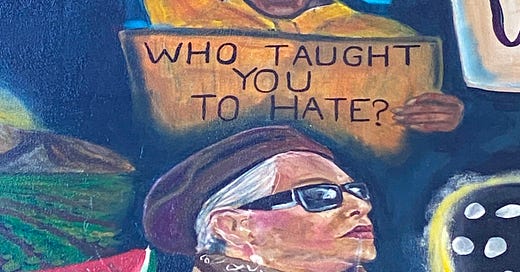We have two questions for the haters
One is blunt, the other is kind. Both could be effective.
It seems decent people have a choice to make.
Is there a “best” way to respond to hateful speech and actions against immigrants or anyone suspected of being “one of them”?
I’ve recently come across two very dissimilar responses for those situations, and each could be effective.
Here’s the first.
“Who taught you to hate?”
I lean toward this response, because I’m pretty much done trying to reason with anyone spewing anti-immigrant sentiments or threatening violence.
“Who taught you to hate?” comes from a beautiful mural in Chicano Park, a cherished, historic site in the Barrio Logan neighborhood in San Diego.
The question is only a very small element in Berenice Badillo’s newly restored 65-foot high work, the tallest of the nearly 100 murals and statues in Chicano Park. But it seemed to leap out at me. (I encourage everyone to look closely at Badillo’s work and all the other murals in Chicago Park, and educate yourself on the park’s history.)
There is so much richness in the mural, images and messages of strength by and for women, that it’s unfair to focus on just one aspect of it.
But this is where I think a lot of us are right now, bracing for fights with the emboldened “patriots” and their hate, racism and xenophobia, grounded in fear and ignorance, stoked by right-wing propagandists, liars and felons.
Granted, asking a rabid anti-immigrant loudmouth, “Who taught you to hate?” won’t do much to de-escalate a confrontation.
But in this ugly period in our history, it’s futile trying to reason with the unreasonable or argue rationally with the irrational. I believe a popular phrase a few years ago was, “Haters gonna hate.”
But if you’re more diplomatic than I am ...
Here’s another approach, a thoughtful response I heard during one of the many webinars about immigration that I attend. It came from a wonderfully kind woman who works for a faith-based humanitarian organization at the US-Mexico border:
“What is your deepest longing?”
It is a disarmingly beautiful question, meant to chart common ground with anyone who disagrees with you about how to treat the men, women and children coming to the U.S. seeking refuge from violence, trauma and poverty.
A hypothetical response from, let’s say an angry white person who supports a certain convicted felon, could be that they want their family to feel safe in their own country, they want their children to have a better life than they’ve had, etc.
How do we respond?
“Well, I want the same things. And so do the people coming to our border — but it’s just not possible in their home country. They don’t want to give up everything to come here, but they have no choice.”
Would this strategy work? Would the question rattle around in the brain of the angry and the fearful long after the exchange? Would it get them to question what’s in their hearts?
I guess it depends on the audience, and your ability to “read the room.”
All I know is that the climate surrounding immigration and the border is going to get much worse after Jan. 20. We need to be prepared.
“Who taught you to hate?”
“What is your deepest longing?”
Keep these questions in your hip pocket. It’s certain you’re going to need one or both of them. And if anyone has other suggestions along these lines, please drop them in the comments.






The problem is evolution created two camps of human beings: the altruistic and the selfish, the brave and the cowardly, the enlightened and the empty-headed. The latter are consumed by fear and easily coerced by what can only be described as greedy, self-motivation on steroids. I like to think it goes against the evolutionary forces that created us and will thus die off, the "we'll get through this," or "this too shall pass" theory. Yet it will still take concerted benevolence to achieve. It will be a stand-off for a while, with the sky's the limit on the damage to life on Earth that may come. All we can do is be the example of the former and never give up. You and the muralists you reference are part of the solution. Thank you for your piece Jim and don't give up the ship!
Thanks for that Jim. Its always good to hear your thoughts. I like both questions though I think the most important part is the dialogue, which right now seems excruciating.